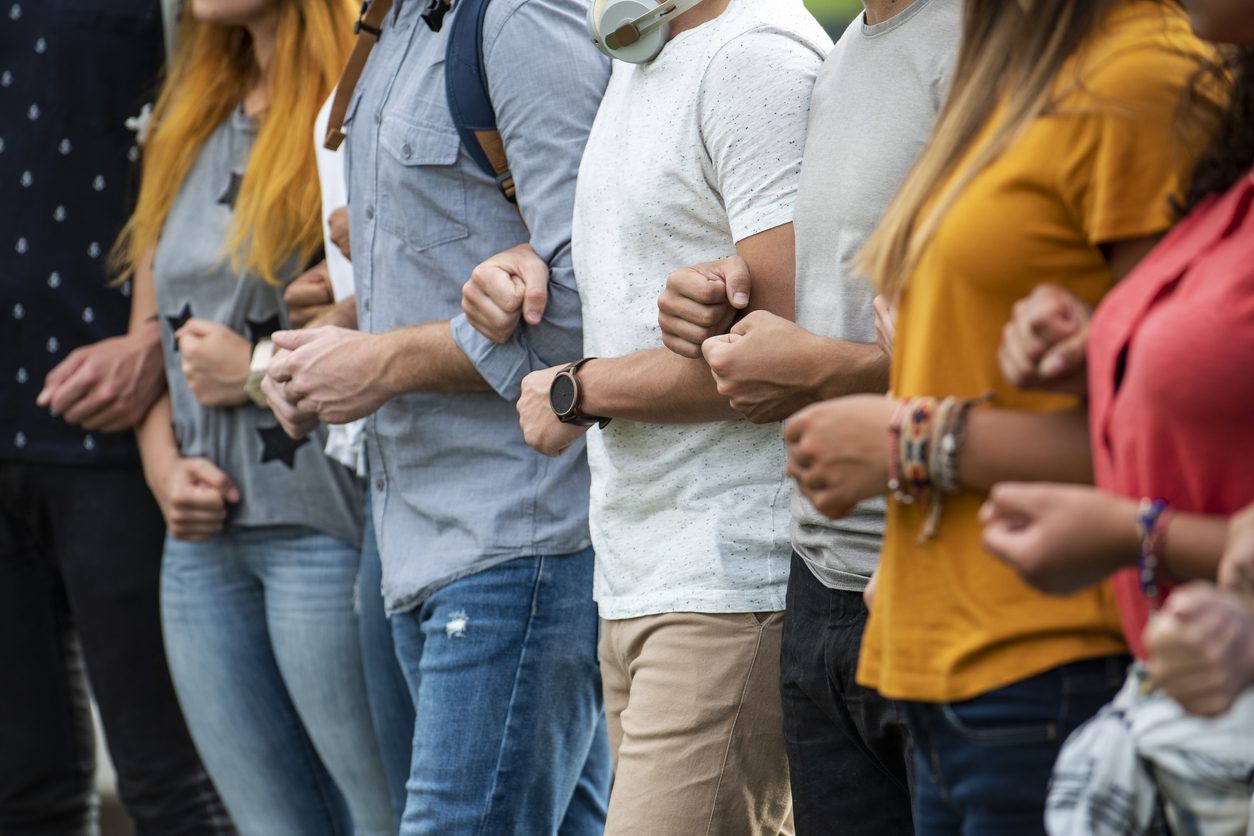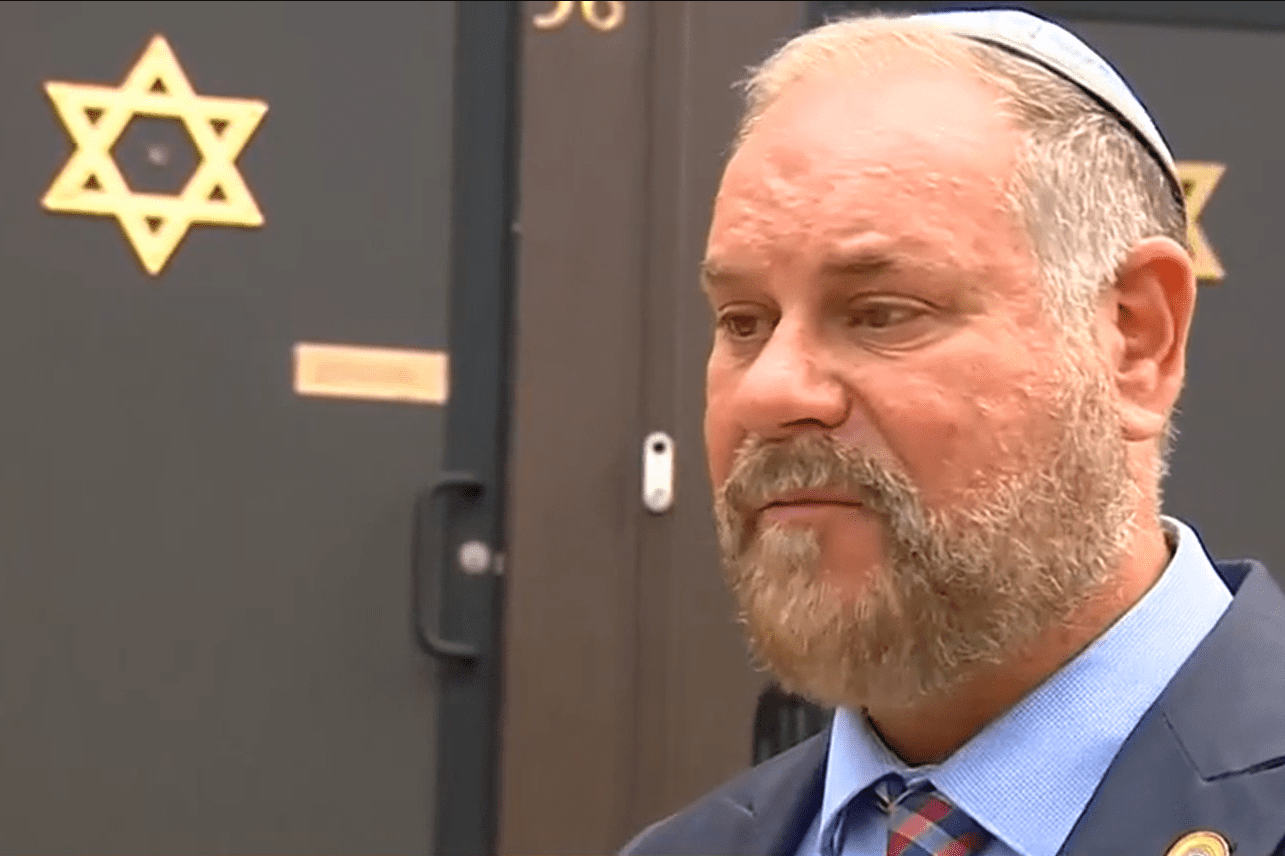By Rich Tenorio
An antisemitic letter is left in the lobby of a college Hillel. A middle school student makes a threat against Jewish classmates that raises fears of violence. Orthodox Jews are targeted for antisemitic abuse because of the way they dress. These are all incidents that have happened to Jewish communities in New England in recent years. Members of the communities affected discussed how they responded, which can go beyond only calling out antisemitism.
In 2022, the Boston neighborhood of Brighton engaged in a community-wide debate over whether to change zoning laws to allow local Orthodox Jews to create a synagogue. There was an incident in which graffiti apparently depicted a Hasidic man smoking a dollar bill, accompanied by a potentially antisemitic statement, according to Ariella Hellman, director of government affairs for the Orthodox organization Agudah Israel New England. Hellman noted that this was especially alarming to community members given the summer 2021 attack on local rabbi Shlomo Noginski, who was repeatedly stabbed outside the neighborhood synagogue Shaloh House.
In March 2023, Agudah Israel of America was represented at a Washington, D.C., conference between Jewish community members and elected officials. Hellman was pleased by the concern shown by elected officials.
She also praised the response to the Brighton graffiti from the City of Boston, which included the expedited acquisition of equipment to remove the hateful image and words.
“It meant a lot to us,” Hellman said.
During the first half of 2023, multiple municipalities in Massachusetts faced antisemitic incidents and took decisive steps to respond to them.
In April, a swastika was found in Natick, close to a local commuter rail station and a Chabad house. As The Boston Globe reported, the hateful imagery was addressed in a creative way: A non-Jewish woman from the area showed her support by using sidewalk chalk to cover the Nazi symbol with an image of a flower and an anti-hate message. Meanwhile, the local Chabad rabbi, Levi Fogelman, organized a protest march that drew Jewish and non-Jewish attendees.
In June, during Pride Month, Congregation Agudath Achim in Taunton was defaced with antisemitic, anti-LGBTQIA+ and anti-Black graffiti, as the Taunton Daily Gazette reported. Because the synagogue has security camera equipment, the vandalism was captured on video, although the perpetrator remains unidentified. The synagogue took concrete steps to address the incident: Both the local police and the Anti-Defamation League were alerted, while an email about the incident was sent to the congregation. The Taunton Gazette article cited two board members stating that this was the first vandalism of Agudath Achim they could remember in their four decades of involvement with the synagogue.
In 2019, when a student in Great Barrington allegedly threatened Jewish classmates, fears were raised of violence toward the latter, according to Rabbi Neil P.G. Hirsch, spiritual leader of the Hevreh of Southern Berkshire.
“The gun violence couldn’t be actualized, but we realized it still had been traumatic to young people, Jewish kids of the school, many of whom are part of my congregation,” Hirsch said.
Hirsch and fellow rabbi Jodie Gordon held a series of conversations for students and parents about what happens when young people encounter antisemitism. Hirsch also reached out to the school district superintendent, the county district attorney’s office and community organizations, including the local Jewish federation. He found a way to help the Jewish students process their experiences. They traveled to Boston, where they participated in a healing session at Mayyim Hayyim and heard a talk on the history of antisemitism from Jeremy Burton, executive director of the Jewish Community Relations Council of Greater Boston. Hirsch reported no major incidents of hate in the Berkshires since then.
In the fall of 2022, an antisemitic letter was anonymously dropped off in the lobby of a Hillel in Providence, R.I., that is affiliated with both Brown University and the Rhode Island School of Design (RISD).
“In the end, it was discovered that it had not been written by a student,” said Rabbi Josh Bolton, the executive director of the Brown RISD Hillel. “The university, the university police, the Providence police, everyone worked very, very fast, with a real sense of mission…We just felt, all around, very, very supported.”
He stressed the importance of continuing to offer vibrant weekly programming that draws not only Jewish students but also non-Jews on campus.
“We really want to be a place where Jewish students feel proud and excited to bring non-Jewish roommates,” Bolton said. “We don’t want to be a parochial club, but one of the great centers of student life that reflects what is best in Brown and RISD. We want Hillel and Jewishness to be seen as one of the thick threads around the fabric of the university, a source of meaning for students who are Jews and non-Jews.”
Sources indicated that fighting antisemitism is a complex process.
On campus, Bolton said, “I don’t want Jewish leaders to feel they have to be reactive to every perspective, every incident that strikes them as somehow distasteful. I want it to be about the fact that our Jewish community, including student leadership, goes beyond the cycle of reactivity.”
He noted, “Brown and RISD are not excluded from the national trend” of antisemitism on campus. “There are incidents.” Yet, he added, “I don’t think those incidents in their own right constitute the actual narrative of the Jewish story here. I think it is one of great resilience, flourishing and vitality.”
Hellman, of Agudah, said, “You have to be very proactive about it. We meet often with Precinct 14 of the local police department. Because we’re proactive about the relationship, when these things come up, we can rely on our government partners to support us.
“Of course, calling it out is important. But the Orthodox community is a little more quiet. In calling it out, we don’t want to be even more attractive to the haters, not give them any more air. We try to keep it as quiet as possible but address the issue. The local police department has increased patrols. The mayor’s office got the graffiti cleaned up. It meant something to our community. Our government partners have our backs.”
Rich Tenorio covers antisemitism news for JewishBoston.com. His work has appeared in international, national, regional and local media outlets. He is a graduate of Harvard College and the Columbia University Graduate School of Journalism. He is also a cartoonist. Email him at richt@cjp.org.





